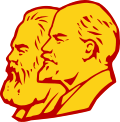| Part of the politics series |
| Party politics |
|---|
| |
| Part of the Politics series |
| Basic forms of government |
|---|
| List of forms · List of countries |
| |
| Part of a series on |
| Economic systems |
|---|
Major types |
In political science, a political ideology is a certain set of ethical ideals, principles, doctrines, myths or symbols of a social movement, institution, class or large group that explains how society should work and offers some political and cultural blueprint for a certain social order.
Contents
- Anarchism
- Classical
- Post-classical
- Contemporary
- Opposition
- Religious variants
- Regional variants
- Authoritarianism
- General
- Other
- Opposition 2
- Religious variants 2
- Regional variants 2
- Communitarianism
- General 2
- Other 2
- Regional variants 3
- Communism
- Authoritarian
- Libertarian
- Other 3
- Opposition 3
- Religious variants 3
- Regional variants 4
- Conservatism
- General 3
- Reactionary
- Opposition 4
- Religious variants 4
- Regional variants 5
- Corporatism
- General 4
- Other 4
- Religious variants 5
- Regional variants 6
- Democracy
- General 5
- Other 5
- Direct democracy movements
- Pirate politics
- Opposition 5
- Religious variants 6
- Regional variants 7
- Environmentalism
- Bright green environmentalism
- Deep green environmentalism
- Light green environmentalism
- Other 8
- Opposition 6
- Religious variants 7
- Regional variants 8
- Fascism
- General 7
- Other 9
- Opposition 7
- Religious variants 8
- Regional variants 9
- Identity politics
- Age-related rights movements
- Animal-related rights movements
- Disability-related rights movements
- Feminism
- LGBTQ social movements
- Men's movement
- Self-determination movements
- Separatist and supremacist movements
- Student movements
- Liberalism
- General 10
- Other 10
- Opposition 9
- Regional variants 14
- Libertarianism
- Left-libertarianism
- Right-libertarianism
- Other 11
- Opposition 10
- Religious variants 11
- Regional variants 15
- Nationalism
- General 11
- Other 12
- Opposition 11
- Religious variants 12
- Regional variants 16
- Unification movements
- Populism
- General 12
- Left-wing populism
- Right-wing populism
- Other 13
- Regional variants 17
- Progressivism
- General 13
- Other 14
- Opposition 12
- Religious variants 13
- Regional variants 18
- Religio-political ideologies
- General 14
- Political atheism and agnosticism
- Political Baháʼí Faith
- Political Buddhism
- Political Christianity
- Political Confucianism
- Political Hinduism
- Political indigenous religions
- Political Islam
- Political Judaism
- Political Neopaganism
- Political Shinto
- Political Sikhism
- Political Taoism
- Political Zoroastrianism
- Satirical and anti-politics
- General 15
- Other 15
- Religious variants 14
- Regional variants 19
- Social democracy
- General 16
- Other 16
- Opposition 13
- Regional variants 20
- Socialism
- General 17
- Authoritarian 2
- Libertarian 2
- Other 17
- Opposition 14
- Religious variants 15
- Regional variants 21
- Syndicalism
- General 18
- Other 18
- Opposition 15
- Regional variants 22
- Transhumanism
- General 19
- Other 19
- Regional variants 23
- See also
- References
A political ideology largely concerns itself with how to allocate power and to what ends it should be used. Some political parties follow a certain ideology very closely while others may take broad inspiration from a group of related ideologies without specifically embracing any one of them.
An ideology's popularity is partly due to the influence of moral entrepreneurs, who sometimes act in their own interests. Political ideologies have two dimensions: (1) goals: how society should be organized; and (2) methods: the most appropriate way to achieve this goal.
An ideology is a collection of ideas. Typically, each ideology contains certain ideas on what it considers to be the best form of government (e.g. autocracy or democracy) and the best economic system (e.g. capitalism or socialism). The same word is sometimes used to identify both an ideology and one of its main ideas.
For instance, socialism may refer to an economic system, or it may refer to an ideology that supports that economic system. The same term may also refer to multiple ideologies, which is why political scientists try to find consensus definitions for these terms.
For example, while the terms have been conflated at times, communism has come in common parlance and in academics to refer to Soviet-type regimes and Marxist–Leninist ideologies, whereas socialism has come to refer to a wider range of differing ideologies which are most often distinct from Marxism–Leninism. [1]
Political ideology is a term fraught with problems, having been called "the most elusive concept in the whole of social science". [2]
While ideologies tend to identify themselves by their position on the political spectrum (such as the left, the centre or the right), they can be distinguished from political strategies (e.g. populism as it is commonly defined) and from single issues around which a party may be built (e.g. civil libertarianism and support or opposition to European integration), although either of these may or may not be central to a particular ideology. Several studies show that political ideology is heritable within families. [3] [4] [5] [6] [7]
The following list is strictly alphabetical and attempts to divide the ideologies found in practical political life into several groups, with each group containing ideologies that are related to each other. The headers refer to the names of the best-known ideologies in each group.
The names of the headers do not necessarily imply some hierarchical order or that one ideology evolved out of the other. Instead, they are merely noting that the ideologies in question are practically, historically, and ideologically related to each other.
As such, one ideology can belong to several groups and there is sometimes considerable overlap between related ideologies. The meaning of a political label can also differ between countries and political parties often subscribe to a combination of ideologies.






































